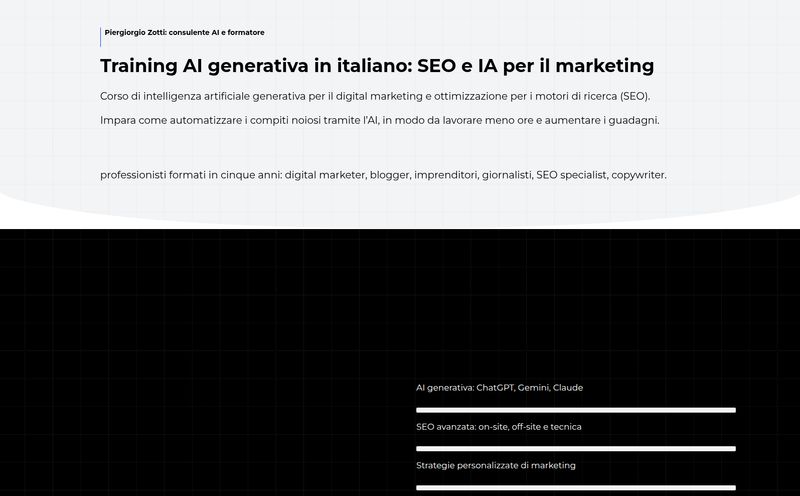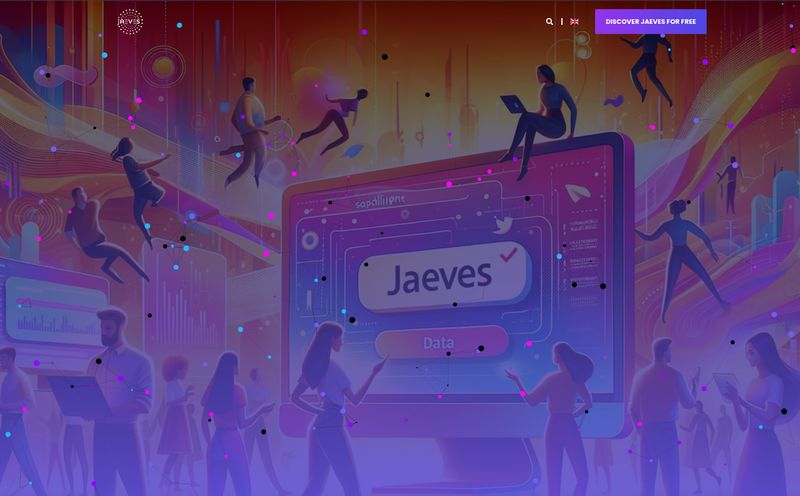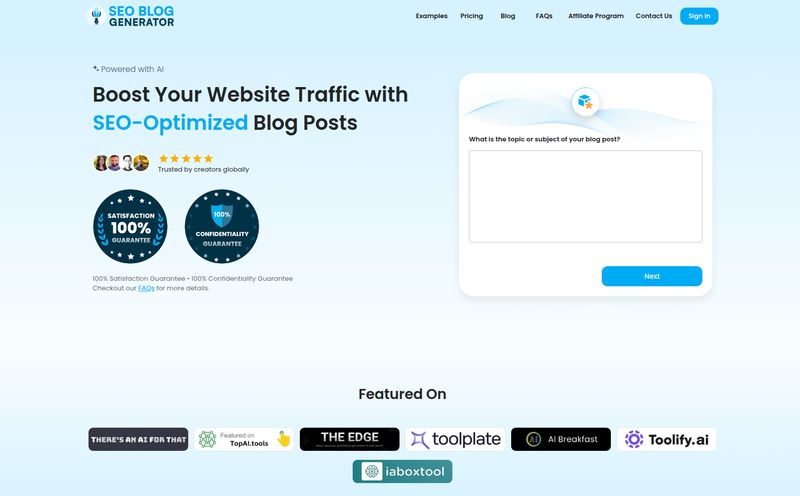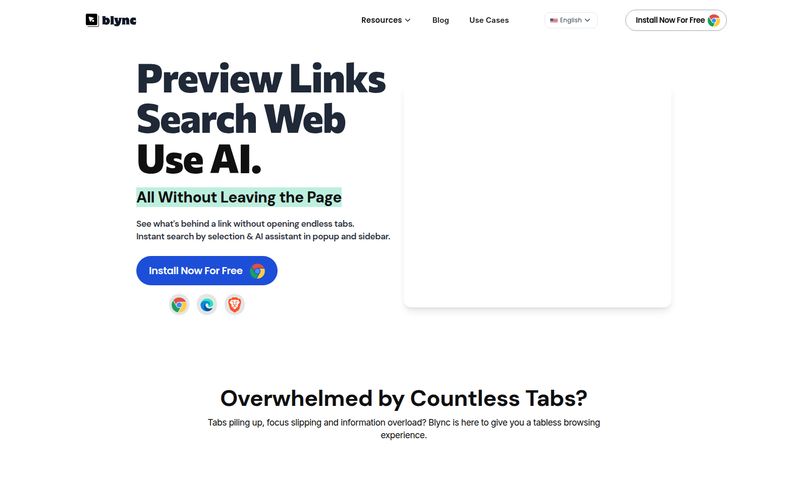The content hamster wheel is exhausting. As an SEO, you’re constantly juggling keyword research, SERP analysis, writing, editing, and then praying to the Google gods that your traffic graph goes up and to the right. For years, we’ve been promised that AI would be our savior, the magical tool that would finally let us step off that wheel. And what did we get? A flood of half-baked AI writers that spit out robotic, soulless text that a fifth grader could spot as fake.
Most of them are, frankly, glorified article spinners. They take a prompt and rephrase existing content without any real understanding of search intent or what actually ranks. So, you can imagine my skepticism when I heard about another AI writing tool. But something about SEO.ing caught my eye. It wasn't just the promise of “high-ranking articles,”—we’ve all heard that before—it was the how. They talked about a system of collaborating AI agents, and that… that was different.
It sounded less like a magic wand and more like a process. And in the world of SEO, process is everything. So I decided to put my cynicism aside, grab a coffee, and see if this thing was legit.
What Exactly is SEO.ing and Why Should You Care?
Here’s the thing that sets SEO.ing apart from the crowd. It’s not a single AI model you throw a prompt at. It’s designed as a small, efficient AI content team. Think of it like a digital assembly line for creating a blog post, where each agent has a specific job. This is what their workflow looks like:
- The Outline Agent: You give it a keyword, and this agent gets to work, generating potential titles and a full article outline.
- The Content Crawler Agent: This is the part that got me excited. This agent actually goes out and crawls existing, high-ranking websites for your target keyword. It's essentially doing automated SERP analysis, figuring out what topics, entities, and structures Google is already rewarding. This is what human SEOs spend hours doing with tools like Ahrefs or SEMrush.
- The Writing Agent: Armed with the outline and the competitive analysis from the crawler, this agent writes the actual content. Because it has so much context, the output is far more relevant than a generic AI writer.
- The Image Agent: Finally, this agent generates and adds relevant images to the article, which is a nice touch to save you even more time.
This multi-step process just makes sense. It mirrors the workflow a real content strategist would follow, which is why I felt a glimmer of hope. Maybe this one would be different.
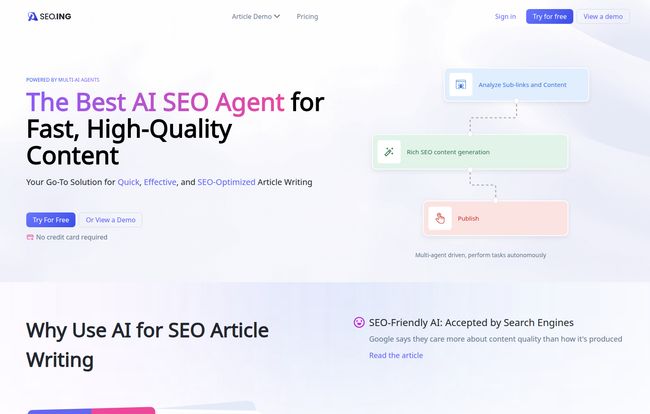
Visit seo.ing
Putting It to the Test: My First Impressions
The company claims you can generate an article in just two clicks, and while that’s a bit of marketing simplification, it’s not far off. The interface is clean. You pop in your keyword, it generates titles and an outline, you approve or tweak it, and then you hit “go.”
Now, it’s not instant. Generating a full, well-researched article takes a few minutes. I’ve seen some people list this as a con, but I actually see it as a pro. Instant results in AI usually mean shallow results. The fact that it takes a moment tells me it’s actually doing the work—crawling, analyzing, and structuring. I’d rather wait five minutes for something solid than get 30 seconds of fluff. The quality of the first draft was… impressive. It wasn't perfect, nothing AI-generated ever is. But the structure was logical, it hit all the key topical points I'd expect for the keyword, and teh grammar was cleaner than a lot of human first drafts I've seen.
The Features That Genuinely Stand Out
After playing around with it for a while, a few features really cemented its value for me.
The Multi-Agent System is a Game Changer
I can't stress this enough. The Content Crawler is the secret sauce. Generic AI tools like ChatGPT are working in a vacuum; they only know the data they were trained on. SEO.ing's crawler gives it real-time context about what’s working on Google right now. This moves it from being a simple “writer” to a genuine “SEO assistant.” It’s a massive leap forward.
Going Global with Multilingual Content
The platform heavily promotes its multilingual support, and for good reason. For anyone running an international business or looking to tap into non-English markets, this is huge. You can generate articles in Spanish, French, German, Japanese, and a bunch of other languages. While I'd always recommend having a native speaker give it a final polish, using this to generate a high-quality V1 draft can save thousands in translation and content creation costs. It opens up international SEO to businesses that previously couldn't afford it.
Customizable Structures That Give You Control
My biggest gripe with most AI tools is the lack of control. You get what you get. SEO.ing solves this by letting you edit the title and the entire H2/H3 outline before the writing agent even starts. Don’t like a heading? Change it. Want to add a specific section? Go for it. This simple step ensures the final article aligns with your specific strategy, rather than just being a generic piece on the topic.
Let's Talk About the Nitty-Gritty: The Good and The Not-So-Good
Alright, no tool is perfect. Let's break it down, conversationally. On the one hand, the upside is massive. You're getting a tool that automates the most tedious parts of SEO content creation—the initial research and the first draft. For a solo blogger or a small team, this means you can suddenly scale your output from one article a week to five or more, without sacrificing the foundational SEO research. That's a huge win.
But here's the reality check. It's still AI. The content, while good, can sometimes lack a distinct personality or voice. It won't have your unique anecdotes or that clever metaphor you thought of in the shower. You absolutely need to do a final pass to inject your own flavor and expertise. Think of SEO.ing as the world’s best research assistant and first-drafter. It delivers a B+ paper that you, the expert, can easily polish into an A+ in 15-20 minutes. It's an assistant, not a full replacement for a creative human mind. And its capabilities with audio or video are still pretty limited.
Who is SEO.ing Actually For?
I can see this tool being a perfect fit for a few different groups:
- Solo Bloggers & Affiliate Marketers: This is a godsend. You can build out topic clusters and pump out content for niche sites at a speed you could only dream of before. The Basic plan is practically built for this.
- Small Businesses & Marketing Agencies: The Professional plan is the sweet spot here. It allows an agency to offer more affordable content services or a small business to finally maintain a consistent, high-quality blog presence without the massive overhead of a dedicated writer.
- Large Enterprises: For companies that need to produce content at a massive scale, the Enterprise plan offers a way to streamline workflows and support multiple teams and languages efficiently.
A Quick Look at the SEO.ing Pricing
Value is always subjective, but when you compare the cost to the time saved, the pricing feels more than fair. They offer a fantastic free plan to start, which is always a good sign.
| Plan | Price | Articles/Month | Best For |
|---|---|---|---|
| Free | $0 | 2 | Trying it out |
| Basic | $15/mo | 10 | Individual creators |
| Professional | $45/mo | 35 | Serious creators & small businesses |
| Enterprise | $150/mo | 120 | Large-scale operations |
Honestly, paying $15 to get 10 well-researched, SEO-focused first drafts is a steal. A single freelance article of decent quality can cost anywhere from $100 to $500. This pricing structure makes advanced content creation accessible to everyone.
Frequently Asked Questions About SEO.ing
- Is the content from SEO.ing truly unique and plagiarism-free?
- In my tests, yes. Because it's generating content based on its analysis rather than just copying and pasting, the output is unique. Like with any AI tool, running it through a plagiarism checker for peace of mind is never a bad idea, but it’s designed to produce original content.
- How much human editing does the content need?
- It depends on your standards. To just get it published? Minimal. To make it a truly great, brand-aligned piece of content? I’d budget 15-30 minutes of editing per article to add personal stories, refine the tone, and double-check any specific data points. It gets you 85% of the way there.
- Can SEO.ing really replace my human writers?
- No, and it shouldn't. It should empower them. Use it to handle the first drafts and research for standard blog posts, freeing up your human writers to work on higher-level, more creative content like thought leadership pieces, case studies, and brand storytelling.
- What makes it different from just using ChatGPT?
- The key difference is the automated, real-time SERP analysis. ChatGPT is a generalist; it doesn't know what's currently ranking for your keyword. SEO.ing's multi-agent process, especially the crawler, builds articles based on a proven, SEO-first foundation, which gives you a significant advantage.
- Is the multilingual content actually good?
- It's surprisingly good for a first draft. It's grammatically sound and contextually relevant. For the best results, especially for important money pages, you should have a native speaker review it. But for scaling a blog into new regions, it's an incredible starting point.
My Final Verdict: Should You Give SEO.ing a Shot?
After spending some quality time with this tool, I’ve moved from skeptic to believer. SEO.ing isn't just another AI writer; it's a well-thought-out content automation system. It understands the fundamental workflow of good SEO and automates the most time-consuming parts.
It’s not a magic button that will instantly get you to rank #1. No tool can promise that. But it is an incredibly powerful assistant that can 10x your content output, improve the quality of your first drafts, and give you a fighting chance in competitive SERPs, all without breaking the bank.
If you're feeling the content creation burn out, I'd say you have nothing to lose. Go sign up for their free plan and generate an article or two. I have a feeling you'll be as pleasantly surprised as I was.
Reference and Sources
- SEO.ing Official Website
- SEO.ing Pricing Page
- Moz - Beginner's Guide to SERP Analysis (For understanding the manual process SEO.ing helps automate)
